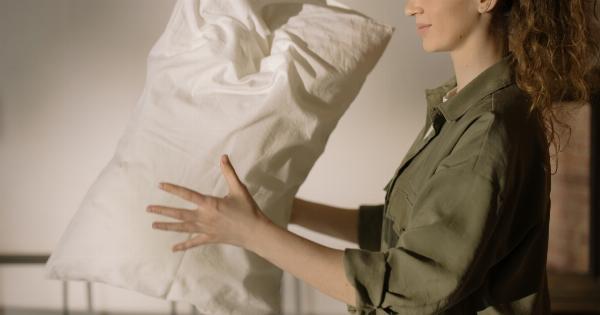When it comes to maintaining good health, keeping your sleeping space germ-free is crucial. Your bed can be a breeding ground for all sorts of bacteria, viruses, and allergens that can compromise your immune system and lead to various health issues.
To ensure a safe and healthy sleep environment, follow these tips:.
1. Wash Your Bedding Regularly
A key step in keeping your sleeping space germ-free is to wash your bedding regularly. This includes sheets, pillowcases, blankets, and any other fabric that comes into direct contact with your body.
Bedding accumulates sweat, skin cells, oils, and other bodily fluids that provide a perfect breeding ground for germs. It is recommended to wash your bedding at least once a week in hot water to eliminate bacteria and allergens effectively.
2. Use Hypoallergenic Pillow and Mattress Protectors
Pillow and mattress protectors are excellent investments for maintaining a germ-free sleeping space. They act as an additional barrier against allergens, dust mites, bed bugs, and spills.
Look for protectors that are hypoallergenic and waterproof to enhance both cleanliness and comfort. Remember to wash the protectors frequently along with your bedding to keep them free from germs.
3. Vacuum and Dust Regularly
Regular vacuuming and dusting are essential to maintain a clean sleeping space. Use a vacuum cleaner with a HEPA filter to effectively remove dust, pollen, pet dander, and other allergens.
Pay specific attention to your mattress, pillows, and the surrounding area. Additionally, dust surfaces like nightstands, lamps, and shelves to prevent dust buildup and keep allergens at bay.
4. Air Out Your Bedroom
Proper ventilation is important in keeping your sleeping space fresh and germ-free. Open your windows daily to allow fresh air to circulate and expel stale air and odors.
This helps reduce the moisture level in your bedroom, making it less favorable for mold and mildew growth.
5. Keep Pets Out of Your Bed
As much as you love cuddling with your furry friends, it’s best to keep them out of your bed. Pets can carry allergens, fleas, ticks, and other germs that can disrupt your sleep and potentially cause health issues.
Train your pets to sleep in their designated areas and regularly clean their bedding to minimize the spread of allergens.
6. Avoid Eating in Bed
While it may be tempting to enjoy a midnight snack or breakfast in bed, it’s best to avoid eating in your sleeping space. Food particles can attract pests like ants and cockroaches, and spills can lead to stains and bacterial growth.
Try to confine all eating activities to your kitchen or dining area to keep your sleeping space clean and free from unwanted visitors.
7. Change Your Pajamas Regularly
Changing into clean pajamas can contribute to a germ-free sleeping space. Just like bedding, your sleepwear becomes a breeding ground for bacteria, sweat, and body odor.
It is recommended to change your pajamas at least every two to three nights to maintain cleanliness. Additionally, opt for breathable fabrics like cotton that are less likely to trap moisture and promote bacterial growth.
8. Disinfect Frequently Touched Surfaces
High-touch surfaces in your bedroom can harbor a significant number of germs. Regularly disinfect surfaces such as doorknobs, light switches, remote controls, and alarm clocks. Use a disinfectant spray or wipes to effectively kill bacteria and viruses.
Pay extra attention to shared surfaces or objects if you have roommates or family members who may be more exposed to germs.
9. Invest in an Air Purifier
An air purifier can tremendously improve the air quality in your sleeping space by removing harmful pollutants, allergens, and germs. Look for a purifier with a HEPA filter to effectively capture small particles and ensure clean, fresh air.
Place the purifier near your bed for optimal results and choose a model with a quiet operation, so it doesn’t disturb your sleep.
10. Practice Regular Hand Hygiene
Good hand hygiene is crucial in preventing the spread of germs to your sleeping space. Wash your hands thoroughly with soap and water for at least 20 seconds before going to bed.
If soap and water aren’t available, use a hand sanitizer with at least 60% alcohol. Avoid touching your face and ensure your hands are clean before touching any surfaces in your sleeping area.
Conclusion
By incorporating these tips into your routine, you can create a germ-free sleeping space that promotes optimal health and quality sleep.
Remember to wash your bedding regularly, use pillow and mattress protectors, vacuum and dust frequently, and practice good hand hygiene. Additionally, keep pets out of your bed, avoid eating in bed, change your pajamas regularly, disinfect high-touch surfaces, invest in an air purifier, and air out your bedroom.
By prioritizing cleanliness and hygiene, you can rest assured knowing your sleeping space is free from harmful germs and allergens.






























